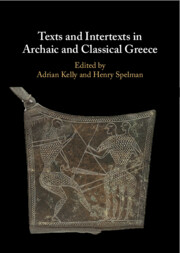Book contents
- Texts and Intertexts in Archaic and Classical Greece
- Texts and Intertexts in Archaic and Classical Greece
- Copyright page
- Contents
- Illustrations
- Tables
- Acknowledgements
- Contributors
- Abbreviations
- Introduction
- Part I Early Intertextuality
- Part II Lyric and Epic
- Part III Drama
- 7 Intertextuality, ‘cf.’, and Fragmentary Drama
- 8 Satyr Drama and the Limits of the Possible
- 9 A Cave with Two Doors
- Part IV Conceptual Contexts
- Bibliography
- Index Locorum
- Index Rerum
8 - Satyr Drama and the Limits of the Possible
Sophocles’ Judgement and the Cypria
from Part III - Drama
Published online by Cambridge University Press: 14 November 2024
- Texts and Intertexts in Archaic and Classical Greece
- Texts and Intertexts in Archaic and Classical Greece
- Copyright page
- Contents
- Illustrations
- Tables
- Acknowledgements
- Contributors
- Abbreviations
- Introduction
- Part I Early Intertextuality
- Part II Lyric and Epic
- Part III Drama
- 7 Intertextuality, ‘cf.’, and Fragmentary Drama
- 8 Satyr Drama and the Limits of the Possible
- 9 A Cave with Two Doors
- Part IV Conceptual Contexts
- Bibliography
- Index Locorum
- Index Rerum
Summary
This chapter considers how we might approach the intertextual relationship between two highly fragmentary texts, in this case Sophocles’ Judgement, a satyr play that dramatised the Judgement of Paris, and the epic Cypria in which that mythological episode featured. The exiguous textual remains of both works are taken as a prompt to consider intertextuality in its broader sense, namely the interrelationship of texts in ways that go beyond direct verbal allusion. The framework of possible worlds is employed to conceptualise the relationship between satyr drama and the world of epic and tragedy on which it draws, suggesting that the latter may be thought of as an actual world on which the alternative world of the former is predicated. Using this as a model of intertextuality allows us to examine the movements of the satyric plot as it opens up and closes down possibilities for radically alternative outcomes. In this reading of Judgement, we see Sophocles engaging with both the Cypria and that epic’s own intertextual network, with the satyrs acting paradoxically as both disruptors of the mythical tradition and a force that supports the story reaching its traditional conclusion.
- Type
- Chapter
- Information
- Texts and Intertexts in Archaic and Classical Greece , pp. 191 - 213Publisher: Cambridge University PressPrint publication year: 2024

